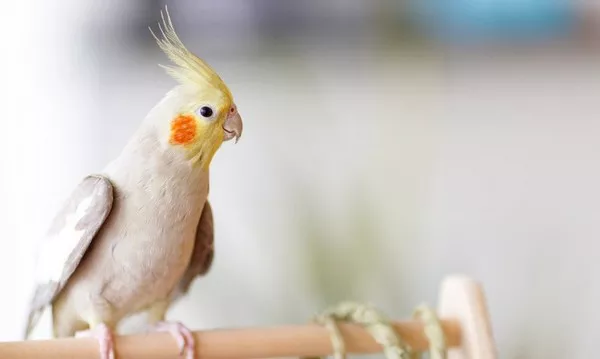Cockatiels are popular pet birds known for their intelligence and playful nature. However, biting is a common issue that many cockatiel owners face. Biting can be attributed to various factors, including fear, aggression, territoriality, or lack of proper training. To ensure a harmonious relationship with your feathered friend, it is essential to address and correct this behavior. In this article, we will discuss effective training techniques to prevent cockatiels from biting.
Understanding the Reasons Behind Biting
Before embarking on a training journey, it is crucial to comprehend why cockatiels bite. Some common reasons include:
Fear or Anxiety: Cockatiels may resort to biting when they feel threatened or uncomfortable in their surroundings.
Territoriality: Cockatiels are naturally territorial birds, and they may bite to establish boundaries or protect their perceived territory.
Lack of Socialization: Inadequate exposure to various environments, people, or other pets during their early stages of development can contribute to biting behavior.
Hormonal Changes: Cockatiels, particularly during breeding season, may become more aggressive and prone to biting.
Establishing Trust and Building a Bond
Building a strong bond with your cockatiel is the foundation of any successful training program. Follow these steps to establish trust:
Patience and Observation: Spend time observing your cockatiel’s behavior to understand their preferences, triggers, and body language.
Hand-Feeding: Begin by hand-feeding your cockatiel their favorite treats, such as millet, using gentle movements. This helps associate your hand with positive experiences.
Step-Up Training: Teach your cockatiel the “step-up” command by offering a finger or perch and gently encouraging them to step onto it. Use positive reinforcement, such as verbal praise or treats, when they comply.
Gradual Progression: As your cockatiel becomes comfortable stepping up, gradually increase the duration of their time on your hand or perch. This helps them build confidence and trust in your presence.
Positive Reinforcement and Redirecting Behavior
Positive reinforcement is a powerful tool when training cockatiels to prevent biting. Follow these techniques:
Reward-Based Training: Whenever your cockatiel exhibits desired behavior, such as not biting, immediately reward them with verbal praise, head scratches, or their favorite treats. Consistency is key for reinforcement to be effective.
Redirection: When your cockatiel attempts to bite, gently redirect their attention to an appropriate toy, perch, or activity. This helps them understand that biting is not the desired behavior.
Avoiding Negative Reinforcement: Never shout at or punish your cockatiel for biting, as it can cause fear or aggression. Instead, focus on reinforcing positive behaviors and providing a safe and stimulating environment.
Socialization and Environmental Enrichment
Cockatiels require socialization and mental stimulation to thrive. Here are some strategies to promote healthy behavior:
Social Exposure: Introduce your cockatiel to various people, animals, and environments gradually. This helps them become comfortable with different stimuli and reduces fear-based biting.
Training Sessions: Engage your cockatiel in short training sessions daily. Teach them commands like “step up,” “wave,” or “turn around.” This not only provides mental stimulation but also strengthens the bond between you and your bird.
Toys and Activities: Offer a variety of toys, puzzles, and foraging opportunities to keep your cockatiel mentally stimulated and prevent boredom. This reduces the likelihood of biting due to frustration or pent-up energy.
Identifying Triggers and Correcting Behavior
Understanding your cockatiel’s triggers is crucial for addressing and correcting biting behavior effectively:
Body Language: Learn to interpret your cockatiel’s body language, such as raised crest feathers, hissing sounds, or aggressive postures. Identifying these signs early can help you prevent potential biting incidents.
Avoiding Triggers: If you notice specific situations or interactions that provoke biting, try to avoid or modify them. For example, if your cockatiel becomes territorial around certain objects, remove or rearrange them to reduce aggression.
Desensitization: Gradually expose your cockatiel to triggering situations or objects in a controlled and positive manner. This process helps them overcome fear or aggression associated with those triggers.
Consulting with Avian Professionals
In some cases, biting behavior may persist despite your best efforts. In such situations, seeking advice from avian professionals, such as avian veterinarians or certified bird behaviorists, can be beneficial. These experts can provide tailored guidance and solutions to address specific issues and help create a harmonious environment for you and your cockatiel.
Conclusion
Training a cockatiel to prevent biting requires patience, consistency, and a deep understanding of your bird’s behavior. By focusing on positive reinforcement, building trust, providing socialization opportunities, and addressing triggers, you can significantly reduce biting incidents. Remember, each cockatiel is unique, and the training process may take time. With dedication and the right approach, you can foster a strong bond with your cockatiel and create a happy and bite-free companionship.
Related Topics:
























